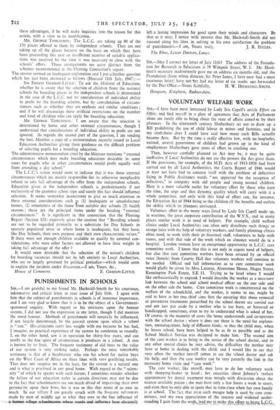BOARDING SCHOOLS AND THE L.C.C.
Sta,—Mr. Wechsler's letter in your issue of the 23rd May drew attention to action taken by the L.C.C. in depriving 80 London schoolchildren of places offered to it by independent schools. This prompted a Parlia- mentary question from me (Hansard 13th June 1947) in the following terms :—
Silt ERNEST GRAHAM-LirrtE: To ask the Minister of Education, whether he is aware that the London County Council has refused the offer of 80 boarding places, made by independent schools; and, as this offer is in accordance with the recommendations of the Fleming Report and its refusal deprives some 80 schoolchildren. of
these advantages, if he will make inquiries into the reason for this action, with a view to its modification.
MR. GEORGE TOMLINSON : The L.C.C. are taking up 90 of the 170 places offered to them by independent schools. They are not taking up all the places because on the basis on which they have been proceeding this year an insufficient number of suitable applica- tions was received by the time it was necessary to close with the schools' offers. These arrangements are quite distinct from the schemes recommended in the Fleming Committee's report.
The answer seemed an inadequate explanation and I put a further question which has just been answered as fol:ows (Hansard 11th July, 1947): SIR ERNEST GRAHAM-LITTLE: To ask the Minister of Education, whether he is aware that the selection of children from the national schools for boarding places in the independent schools is determined in the case of the L.C.C. not by consideration of individual ability to profit by the boarding scheme, but by consideration of circum- stances such as whether they are orphans and similar conditions ; and if he will discourage these artificial restrictions on the number and kind of children who can apply for boarding education.
MR. GEORGE TOMLINSON : I am aware that the selection is determined by home and other external circumstances, though I understand that considerations of individual ability to profit are not ignored. As regards the second part of the question, I am sending the hon. Member a copy of a memorandum recently issued to Local Education Authorities giving them guidance on the difficult problem of selecting pupils for a boarding education.
The administrative memorandum cited by the Minister mentions " external circumstances which may make boarding education desirable in some cases for pupils who in other circumstances would profit equally well from attending a day school."
The L.C.C.'s action would seem to indicate that it was these external circumstances which are mainly responsible for its otherwise inexplicable refusal to take full advantage of the offer from the independent schools. Education given at the independent schools is predominantly if not exclusively of the grammar school type and surely this fact should influence selection. It seems somewhat inconsistent to give so much attention to these external considerations such as (1) inadequate or unsatisfactory homes, (2) remoteness of the home from suitable day schools (3) health reasons ; these are the principal items under the heading " external circumstances." It is significant in this connection that the Fleming Report (Section 121) expressly gives the caution that "Boarding schools are not -to be regarded primarily as a substitute for Day Schools in sparsely populated areas or where home is inadequate, but they have, like Day Schools, their own purpose and their own characteristic values." If there were not enough children available to qualify by external con- siderations, why were other factors not allowed to have their weight in taking full advantage of the offer ?
It would seem desirable that the selection of the nation's children for boarding vacancies should not be left entirely to Local Authorities, who are so largely governed by political prejudice—which would seem to explain the incident under discussion.—I am, Yours, &c.,



































 Previous page
Previous page